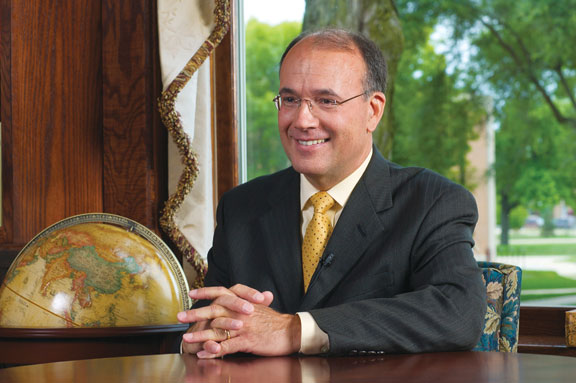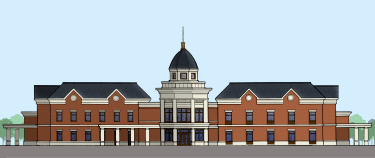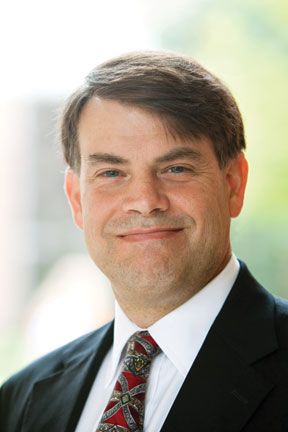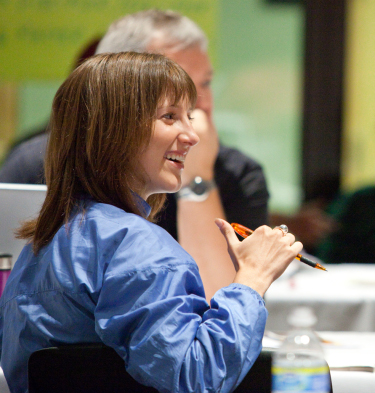The Wesleyan Church is a small evangelical denomination that claims a worldwide membership of about 400,000. It has not had its own seminary since the 19th century. But in 2006, several years of dialogue and prayer led church officials and the leaders at Indiana Wesleyan University (IWU) to a firm conclusion: It was time to have their own seminary. Ken Schenck remembers it well. "We sent around 'rousing the troops' e-mails—'Real denominations have seminaries' was the battle cry. 'Either let's found one or join a real denomination.'"
Now Ken Schenck is the dean of a brand-new theological school called Wesley Seminary at Indiana Wesleyan University.
Ramping up
 |
"We will be making strong efforts to build endowments going forward, but we didn't want to wait until we had the endowment built to start the seminary."
Henry Smith, President
Indiana Wesleyan University |
Shortly after the rousing e-mail messages, "coffee chats" were hosted at the home of IWU's new president, Henry Smith, who took office in July 2006. By November 2006, William Miller of the Association of Theological Schools was brought in for advice. The joint faculties of the university's undergraduate religion division and its department of graduate ministries unanimously approved core values that fall. The summer of 2007 was spent in intensive curriculum design, and the initial curriculum proposal came through in August 2008. By the beginning of 2009, North America was well into a recession. Nevertheless, in April 2009, the IWU board of trustees voted to create a seminary to house the new 75-hour master of divinity and existing 36-hour master of arts in ministry degrees. In August, Wesley Seminary at Indiana Wesleyan University welcomed its first class of 30 M.Div. students, divided into two cohorts. Together with 170 students in the M.A. in ministry program, they make up the new student body, but seminary leaders hope to reach an enrollment of 250 M.Div. students by the time this first class graduates in three years. Down the line, Schenck thinks it's realistic to hope for 500 students in M.A. and M.Div. programs within five years.
Meteoric growth
IWU is proof you don't need a major metropolitan center to build a successful university. Founded in 1920 as Marion College and affiliated with the Wesleyan Church, this private Christian university was a small liberal arts college until 1988. Along the way, the school added master's programs in theology, ministerial education, and nursing. But the focus was residential, and students studied in Marion, a community of 31,000 residents that lies about halfway between Indianapolis and Fort Wayne, Indiana. Then, in the mid-1980s, everything changed. School leaders set their sights on growth and, in 1988, changed the college's name to Indiana Wesleyan University. Over the last 25 years, sparked by nontraditional, accelerated programs for working adults, enrollment has climbed from 1,087 to about 15,400. Of those, 12,500 students are enrolled in adult programs, administered under the umbrella of the College of Adult and Professional Studies.
The meteoric rise from a small, local college to the largest and fastest-growing private university in Indiana (and the largest member of the Council of Christian Colleges and Universities) has been fueled by growth in online courses. Today around 30 percent of Indiana Wesleyan's students are pursuing an online degree. President Henry Smith says that during the next four years, he wants to raise that percentage to 50.
Ambivalence about theological education
The Wesleyan Church was founded in 1843 in Utica, New York, and its early leaders were dissident Methodists who opposed slavery, supported the rights of women, and felt that the Methodist church, which they had just left, had lost its religious fervor while striving for respectability. Most felt that Methodism had slipped from rigorous adherence to the teachings about personal holiness taught by its 18th-century English founder, John Wesley.
The Wesleyan Church has never required a divinity degree for ordination, but formal study of the Bible has always been important. Two Wesleyan undergraduate theological institutions founded around 1850 survive today. One, Adrian College, later merged with another school of a different small holiness denomination, the Methodist Protestants, and eventually became affiliated with the mainline United Methodist Church. The other, Wheaton College, came under the influence of revivalist Congregationalists and became an independent, nondenominational college. In lieu of a denominational seminary, the Wesleyan Church has long trained its ministers through approved alternate courses of study.
Some Wesleyan Church members—especially lay people—have been suspicious of theological education. Some have thought that too much study might drown out personal zeal, and some participated in the anti-intellectualism common among conservative Protestants of the 19th and 20th centuries, when academic training seemed tightly wedded to secularizing teachings in the sciences and theology.
On the other hand, Wesleyans have always emphasized knowledge of the Bible as an essential prerequisite for ministry. Wanting to train leaders swiftly and move them into ministry without delay, the church embraced Bible institutes or Bible colleges as a practical choice. Typically three or fewer years of schooling beyond high school, these schools emphasized preaching, intense study of the Scriptures in English, and useful subjects like youth ministry, music, and religious education for children.
More recently, Wesleyan Church leaders developed a list of seven approved seminaries—some independent, like Asbury Theological Seminary, and others run by sister denominations, like Nazarene Theological Seminary. (The complete list is at http://www.wesleyan.org/em/he_seminaries.)
Nevertheless, postgraduate theological education has never been very popular among Wesleyan pastors, and only 15 percent have earned a seminary degree. Increasing that number is a goal both of the denomination and of the new seminary. But Wesleyan Church leaders know that if working pastors are going to earn a theological degree, then theological education must be both appealing and accessible to people who are already in full-time ministry.
An article in the Fall 2009 issue of IWU's magazine, The Triangle, suggests that Wesleyans continue to be disenchanted with the idea of a seminary education:
One is the perception that seminaries make you less spiritual. There is actually a study that documents, to some extent, that there may be some truth to that. Some criteria they used were how much time you spent in prayer and how much time you spent reading your Bible. They came to the conclusion that seminaries did seem to diminish the classical indicators of spirituality.
Even less profound is the perception that seminaries are irrelevant. The thinking here is that you go to a seminary and you study Greek and Hebrew and fill your head with what a bunch of German scholars said in the 1800s and you come out no better equipped to preach the word or minister to people than you did when you went in.
Both of those ideas probably are caricatures, but there is enough truth to them that a lot of people have not perceived seminaries as something that is helpful. And finally, of course, you have to go away for three years, so you take a healthy chunk out of your life when you could be doing ministry.
The planning committee has taken seriously this perception of distance between seminary and ministry. Like IWU's College of Adult and Professional Studies, the new Wesley Seminary is providing hybrid course modes designed for people who work full-time. Nearby students come to campus one day per week and do the rest of their work online, while those who live farther away visit the campus for an intensive week at least once per year. Accreditation by the Association of Theological Schools has been important to the project from the beginning, and the seminary planning committee brought in ATS consultants early in the process. They expect to gain ATS accreditation when the first class graduates, but they also hope that in the future, fully online M.Div. degrees will be permitted. Says President Smith, "Frankly, we would like to push that envelope as much as we can. But at this point, we are committed to not pushing it any further than what ATS will allow."
 |
|
A preliminary drawing of the proposed new home of Wesley Seminary at Indiana Wesleyan University. For now, the seminary is sharing space on the IWU campus with other departments.
|
Church and seminary, hand in hand
In keeping with a practical focus, the new seminary's educational philosophy mixes theoretical and practical issues into each course. And the school requires that seminarians work in a church at least 20 hours each week. "You will do action research with members
 |
| "Bible, theology, and church history are incorporated into every week of the course. In the same week [that] you are talking about strategizing for mobilization, you will read excerpts from John Calvin and John Wesley."
Ken Schenck, Dean
Wesley Seminary at Indiana Wesleyan University
|
of your youth group or congregation every week," says Dean Schenck. The expectation is that students will bring ministry concerns with them, airing and examining them in light of what they are learning. Schenck imagines a sort of educational feedback loop, in which students return to their churches to ask questions like these: "If these are the stages of a church's life cycle, where would you say we are?" And "If these are the four types of forces that cause change in a local church, which would you say are most in play right now?"
The practical focus will not mean ignoring the traditional disciplines. "Bible, theology, and church history are incorporated into every week of the course," Schenck says. "In the same week [that] you are talking about strategizing for mobilization, you will read excerpts from John Calvin and John Wesley and then compare and contrast classical predestination with Wesley's prevenient grace." He believes that this approach can help as students learn to apply the classic theological studies to their current ministry.
The most important payoff of the nonresidential, in-ministry model is that it opens the door to people already working in small congregations. Most Wesleyan churches are small and lack the resources to support a pastor for full-time, residential theological education. But even a small congregation can support a minister who is pursuing a part-time, mostly online degree program. "A church of 100 could pull this off," says Wayne Schmidt, vice president of the new seminary.
For the Wesleyan Church as a denomination, clergy education is an increasingly important priority. Jo Anne Lyon, one of the church's three general superintendents, is unsatisfied with the low percentage of Wesleyan pastors who hold seminary degrees. "Fifteen percent?" she exclaims. "I would like to see it at 50 percent in the next few years!"
 |
|
On August 9, Wesley Seminary at Indiana Wesleyan University inaugurated its first M.Div. class with a convocation at its main campus in Marion, Indiana. Among the first students: Paul Tillman (pictured in title photo), pastor of spiritual formation at Lighthouse Ministries Wesleyan Church in Elk Grove, California, and Jessica Schmerse (above), assistant pastor at Mountain View Wesleyan Church in Aumsville, Oregon.
(Photos by Casper Hamlet)
|
Lyon's concern is for education not for its own sake, but as a means to an end. "We hope it will be an extension of the church's mission to build the Kingdom through effective pastors," she says. As a bonus, she suspects that pastors with theological training will be more likely to remain in the ministry, reducing the denomination's current high rate of attrition.
To make this happen, the seminary is tailoring the delivery mode to working pastors. It is also offering 50 percent tuition scholarships to Wesleyan students on top of grants given by the denomination itself. With this aid, Wesleyan Church students can attend for just $100 per credit hour. Further financial help from some individual districts help some students to attend for no personal cost at all.
How can Indiana Wesleyan University offer such generous aid during a difficult financial climate? For one thing, IWU has been less reliant on endowment income than many schools. "It's much more ‘cash in, cash out,'" says Russ Gunsalus, an IWU professor and a member of the planning committee. "The school didn't lose as much when the markets collapsed."
The Wesleyan Church has long been giving $1.1 million per year to IWU. So in one sense, the $1 million per year that IWU has earmarked for seminary startup costs and scholarships is simply giving back. "We will be making strong efforts to build endowments going forward," says President Smith, "but we didn't want to wait until we had the endowment built to start the seminary. We'll worry about that over the next decade."
Another plus: IWU already has classroom space, administrative offices, dining facilities, and other infrastructure in place to deliver education both on site and online. "We have a delivery system that's very proven and very effective," says Duane Kilty, the chief financial officer of Indiana Wesleyan University, who is also serving as CFO of the new seminary. So while the seminary's leaders dream of their own building and dedicated facilities, right now they are sharing space - along with other infrastructure—with the rest of the university.
The importance of the proven delivery system cannot be underestimated. If Wesley Seminary is going to succeed while some other theological schools are struggling, its success will be driven by the same engine that has allowed the parent university to increase its head count by 14-fold over the last 25 years. Indiana Wesleyan University has thrived by marketing itself to working adults and meeting their needs for flexible programs that fit around existing jobs and family commitments. The university has developed an area of expertise and is now applying that expertise to theological education.
The result may be a successful start-up, even in the middle of dreadful economic downturn. Tough economic times are sometimes just the times when new models can take root and thrive.